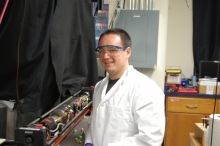
Major:
Mentor(s):
Faculty Sponsor(s):
Faculty Sponsor's Department(s):
Project Title:
Project Description:
Metal catalysts such as supported Palladium (Pd) nanoparticles play a crucial role in many industrial processes. One surface reaction in which supported Pd nanoparticles is heavily utilized is the partial hydrogenation of acetylene into ethylene, which is one of the most important commodity chemicals in the world. To further examine this catalytic system, and specifically the catalyst support interaction, mixed Pd/SiO2 nanoparticle catalysts were synthesized via a micro-plasma reactor for use in the partial hydrogenation of acetylene to ethylene. The Pd/SiO2 catalysts were then characterized via several techniques, including: powder X-Ray diffraction (XRD), X-Ray photoelectron spectroscopy (XPS), Differential Mobility Analysis (DMA), atomic force microscopy (AFM) and Raman vibrational spectroscopy, the results of which revealed the presence of 1 to 20 nm nano-crystalline Pd in a SiO2 matrix. The activity of Pd and Pd/SiO2 particles for acetylene hydrogenation were then tested in a flow reactor, with the exit products analyzed directly in a gas chromatograph (GC), from which acetylene conversion, ethylene and ethane selectivity and reaction rates can be calculated. From these results we see that these Pd/SiO2 nanoparticles are catalytically active (>95 % acetylene conversion) and highly selective towards ethylene (5.4 times more than ethane) at 200° Celsius. This information is important in future classification of metal nanoparticle catalysts as well as providing a better understanding of the surface reactions that occur on catalysts commonly used in industry.
